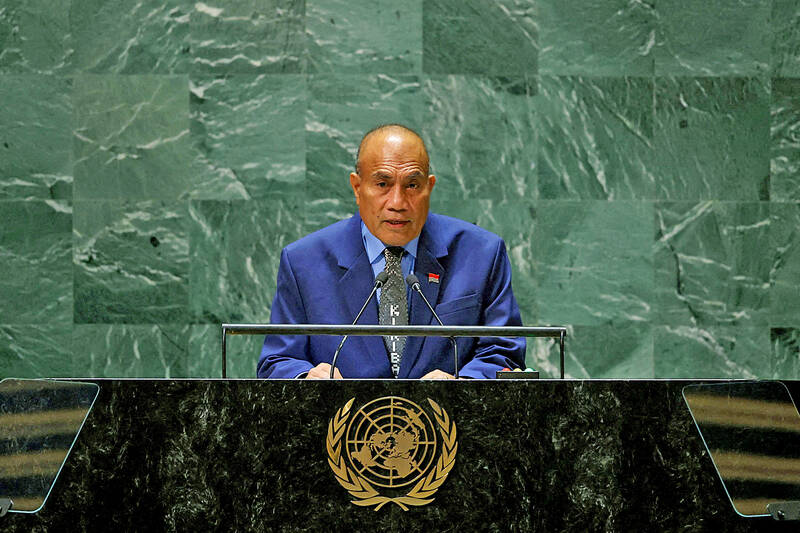New Zealand is reconsidering all development funding to the aid-dependent island nation of Kiribati, following a diplomatic snub from the leader of the former ally of Taiwan, government officials said.
The unusual move to review all finance to Kiribati was prompted by the abrupt cancelation of a planned meeting on Tuesday and Wednesday last week between Kiribati President Taneti Maamau and New Zealand Minister of Foreign Affairs and Trade Winston Peters, Peters’ office said late on Monday.
It followed months of growing frustration from Australia and New Zealand — jointly responsible for more than one-third of overseas development finance to Kiribati in 2022 — about a lack of engagement with the island nation.

Photo: Reuters
Tensions have risen since Kiribati in 2019 switched ties from Taiwan to China and signed a series of bilateral deals with Beijing, including hosting Chinese police. Since the shift, China has increased aid to Kiribati.
A spokesman for Peters said that about a week prior to Peters’ departure, the office was told Maamau was no longer available to receive him.
“This was especially disappointing because the visit was to be the first in over five years by a New Zealand minister to Kiribati — and was the result of a months-long effort to travel there,” he said, adding that “the lack of political-level contact makes it very difficult for us to agree joint priorities for our development program.”
“For this reason, we are reviewing our development program in Kiribati. The outcomes of that review will be announced in due course. Other aspects of the bilateral relationship may also be impacted,” he said.
That might also affect visa allocations for i-Kiribati, who want to travel to New Zealand to work in seasonal jobs such as fruit picking, he said.
The acrimony between the nations reflects concern from Western powers that their interests in the region are being undermined as China woos Pacific leaders with offers of funding and loans.
That has provoked a contest for influence over Kiribati, an atoll nation that is among the world’s most imperiled by rising sea levels. Its proximity to Hawaii and its vast exclusive economic zone — the world’s 12th-largest — have boosted its strategic importance.
Kiribati, one of the world’s most aid-dependent nations, relies heavily on international support, with foreign assistance accounting for 18 percent of its national income in 2022, data from Australian think tank the Lowy Institute showed.
About 10 percent of development finance that year came from New Zealand — which contributed NZ$102 million (US$57.75 million) between 2021 and last year, official figures showed.
However, officials in Wellington and Canberra have expressed frustration over a lack of engagement from Tarawa regarding development projects. Frictions escalated when Kiribati suspended all visits from foreign officials in August last year, citing a need to focus on the government formation process after elections that month.
The government of Kiribati did not respond to a request for comment, although Kiribati Minister of Education Alexander Teabo yesterday told Radio New Zealand that Maamau had a long-standing engagement on his home island — and denied a snub.

MAKING WAVES: China’s maritime militia could become a nontraditional threat in war, clogging up shipping lanes to prevent US or Japanese intervention, a report said About 1,900 Chinese ships flying flags of convenience and fishing vessels that participated in China’s military exercises around Taiwan last month and in January have been listed for monitoring, Coast Guard Administration (CGA) Deputy Director-General Hsieh Ching-chin (謝慶欽) said yesterday. Following amendments to the Commercial Port Act (商港法) and the Law of Ships (船舶法) last month, the CGA can designate possible berthing areas or deny ports of call for vessels suspected of loitering around areas where undersea cables can be accessed, Oceans Affairs Council Minister Kuan Bi-ling (管碧玲) said. The list of suspected ships, originally 300, had risen to about 1,900 as

Japan’s strategic alliance with the US would collapse if Tokyo were to turn away from a conflict in Taiwan, Japanese Prime Minister Sanae Takaichi said yesterday, but distanced herself from previous comments that suggested a possible military response in such an event. Takaichi expressed her latest views on a nationally broadcast TV program late on Monday, where an opposition party leader criticized her for igniting tensions with China with the earlier remarks. Ties between Japan and China have sunk to the worst level in years after Takaichi said in November that a hypothetical Chinese attack on Taiwan could bring about a Japanese

MORE RESPONSIBILITY: Draftees would be expected to fight alongside professional soldiers, likely requiring the transformation of some training brigades into combat units The armed forces are to start incorporating new conscripts into combined arms brigades this year to enhance combat readiness, the Executive Yuan’s latest policy report said. The new policy would affect Taiwanese men entering the military for their compulsory service, which was extended to one year under reforms by then-president Tsai Ing-wen (蔡英文) in 2022. The conscripts would be trained to operate machine guns, uncrewed aerial vehicles, anti-tank guided missile launchers and Stinger air defense systems, the report said, adding that the basic training would be lengthened to eight weeks. After basic training, conscripts would be sorted into infantry battalions that would take

DEEP-STRIKE CAPABILITY: The scenario simulated a PLA drill that turned into an assault on Taiwan’s critical infrastructure, with the launchers providing fire support Taiwan yesterday conducted this year’s first military exercises at Longsiang Base in Taichung, demonstrating the newly acquired High Mobility Artillery Rocket System’s (HIMARS) ability to provide fire support and deep-strike capabilities. The scenario simulated an attack on Penghu County, with HIMARS trucks immediately rolling into designated launch areas and firing barrages at the Wangan (望安) and Cimei (七美) islands, simulating the provision of fire support against invading forces. The HIMARS are supposed to “fire and leave,” which would significantly increase personnel and equipment survivability, a military official said. The drill simulated an exercise launched by the Chinese People’s Liberation Army (PLA) Eastern